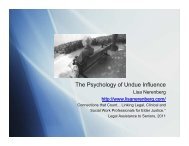Undue Influence: Definitions and Applications - California Courts ...
Undue Influence: Definitions and Applications - California Courts ...
Undue Influence: Definitions and Applications - California Courts ...
Create successful ePaper yourself
Turn your PDF publications into a flip-book with our unique Google optimized e-Paper software.
Specific circumstances in which wills are likely to be challenged are when testators have<br />
psychiatric conditions, including dementia (accounting for 40%), alcohol abuse (28%), <strong>and</strong> other<br />
neurological/psychiatric conditions (28%). In these situations, courts must determine whether<br />
“testators,” those executing wills, had “testamentary capacity.” The criteria for testamentary<br />
capacity were defined by Lord Cockburn in 1870. Known as Lord Cockburn’s Rule, they remain<br />
the basis for most American <strong>and</strong> English commonwealth inheritance laws.<br />
1) The testator underst<strong>and</strong>s the nature of the act he or she is engaging in. The individual must<br />
know that he or she is writing a will <strong>and</strong> what a will is.<br />
2) The testator has to appreciate the effect of the act (the distribution of wealth).<br />
3) The testator must know the extent of his or her bounty (property) in order to appreciate the<br />
significance of the decision.<br />
4) The testator comprehends <strong>and</strong> appreciates the claims to which he ought to give effect (those<br />
who should be included <strong>and</strong> excluded, or, as it is commonly phrased in current language,<br />
“know their natural heirs”).<br />
5) The final component is that no insane delusion shall influence his will.<br />
In the Mohr study, allegations of undue influence were made in 56% of contestations, <strong>and</strong><br />
most challenges to wills based on undue influence were successful (Mohr, 1997). Although<br />
definitions of undue influence with respect to wills vary by state, most laws contain the notion of<br />
a power imbalance or dependency between the parties that is used to influence (through<br />
coercion, compulsion, or deception) the weaker party to secure changes in how assets are<br />
distributed to the stronger individual. <strong>Courts</strong> require a showing that the will of the testator is<br />
subjugated to the will of another. It must also be shown that testators’ disposal of property is<br />
different from that which would have occurred otherwise (Nievod, 1992).<br />
The Presumption of <strong>Undue</strong> <strong>Influence</strong><br />
Ordinarily, those who seek to show that certain acts or transactions were the product of<br />
undue influence have the responsibility for proving that undue influence has occurred. However,<br />
in certain situations in which the likelihood of wrongdoing is high, it may trigger a<br />
“presumption” of undue influence. When a presumption exists, the onus shifts from the accuser<br />
101




